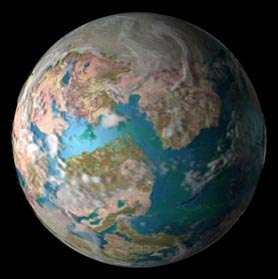Meteor impacts may have kick-started life on Earth
 London, Dec 9 : A new research has suggested that meteorite impacts during Earth’s early history could have created amino acids, which kick-started life on the planet.
London, Dec 9 : A new research has suggested that meteorite impacts during Earth’s early history could have created amino acids, which kick-started life on the planet.
Exactly how and when organic molecules appeared in abundance on the young Earth, leading to the origin of life about 4 billion years ago, has been unclear.
But, according to a report in New Scientist, a new research by Yoshihiro Furukawa at Tohoku University in Sendai, Japan, and colleagues, suggests that meteor impacts could have created amino acids, the building blocks of life.
The team used a high-velocity propellant gun to simulate the impacts of ordinary carbon-containing chondrite meteorites, the most common type of meteorite, into the early ocean.
Afterwards, they recovered a variety of organic molecules, including fatty acids, amines, and an amino acid.
Oceans began to form about 4.3 billion years ago, when meteorites were hitting Earth about 1000 times more frequently than they do today, according to Furukawa.
“This study is the first to show that an amino acid can be synthesised by a naturally possible mechanism on the early Earth,” he said.
Although the team generated only one type of amino acid, they suspect that by varying the conditions of their experimental impacts, they will be able to generate others.
In earlier meteorite impact studies, the team generated fine particles, which they say had the potential to become clay.
According to the researchers, during an impact, clay could have trapped substantial amounts of the organic molecules formed in the same event, and then settled as marine sediment.
Some of these organic molecules might have evolved as a precursor to life. The rest might have sunk to the deep crust and mantle to become graphite or diamond. (ANI)